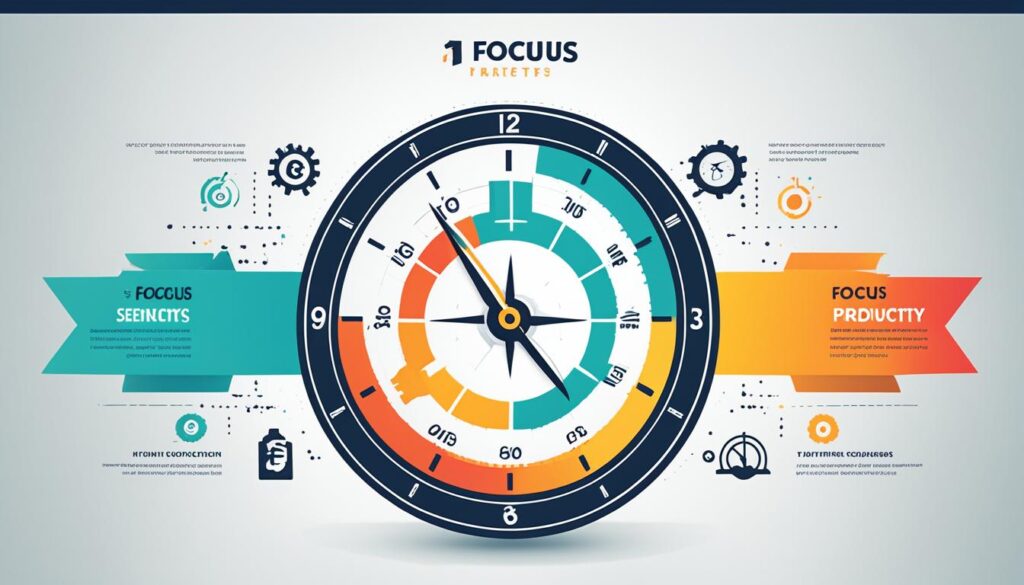Achieve More with Goal Setting and Time Management

“The future depends on what you do today.” – Mahatma Gandhi
Setting goals and managing your time effectively are crucial skills for achieving success in both your personal and professional life. When you have a clear vision of what you want to accomplish and manage your time efficiently, you can make steady progress towards your goals and maximize your productivity.
In this article, we will explore the power of goal setting and time management and how they go hand in hand to propel you towards success. We will delve into effective goal setting techniques, time management strategies, and the myriad of benefits that result from combining the two disciplines. From SMART goals to time blocking, we will provide practical tips and insights to help you achieve more and make the most of your time.
So, if you are ready to take control of your future and embrace the power of goal setting and time management, let’s dive in!
Key Takeaways:
- Setting clear and well-defined goals is essential for achieving success.
- Prioritization helps balance immediate tasks with long-term goals.
- Focus and productivity are enhanced by setting SMART goals and utilizing time management techniques.
- Motivation and accountability are fostered through goal commitment and effective time management.
- Overcoming procrastination is possible with the help of time management strategies.
Clarity of Purpose
Setting clear and well-defined goals is crucial for achieving success. Your goals provide direction and purpose to your actions, acting as a guiding light throughout your journey. However, without a structured approach, these goals can remain abstract and difficult to attain. That’s where time management comes in to bring clarity to your purpose.
Time management is like the architect of your goal-setting process, helping you transform broad objectives into concrete plans. By allocating specific time and resources to each goal, you ensure that they are pursued with focus and intentionality. When you have a clear structure in place, you can effectively prioritize and allocate your time towards achieving your well-defined goals.
Imagine your life as a beautiful piece of artwork, with your goals as the vibrant colors that fill the canvas. Clarity of purpose acts as the masterstroke, bringing your vision to life and creating a sense of purposeful direction. Embracing a time management structure empowers you to make the most of each brushstroke, ensuring that every task and action contributes meaningfully to the masterpiece you are creating.

The Benefits of Clarity of Purpose
When you have a clear sense of purpose and a well-defined roadmap, several benefits arise:
- Increased focus: Clarity allows you to concentrate your energy and attention on the most important tasks that align with your goals.
- Enhanced motivation: Knowing exactly what you’re working towards fuels your intrinsic motivation, propelling you forward even when faced with challenges.
- Improved decision-making: Clarity helps you make sound decisions by providing a framework for evaluating options based on their alignment with your goals.
- Efficient time allocation: With a clear purpose, you can allocate your time and resources effectively, optimizing your productivity and progress.
- Reduced distractions: Having a strong sense of purpose enables you to identify and eliminate unnecessary distractions, keeping you on track towards your goals.
- Greater satisfaction: Accomplishing well-defined goals brings a sense of fulfillment and satisfaction, as each milestone achieved represents progress towards your ultimate vision.
By embracing the synergy between clarity of purpose and time management, you lay a solid foundation for success. Let’s explore the power of prioritization in the next section.
Prioritization
Prioritization is a crucial skill in today’s fast-paced world filled with distractions and competing demands for your time and attention. Without effective prioritization, it’s easy to get caught up in the busyness of everyday tasks and lose sight of your long-term goals.
Setting clear goals is the first step in prioritizing your tasks and responsibilities. By identifying and defining your most important aspirations, you can focus your time and energy on what truly matters. Goal setting provides a roadmap for your actions and helps you stay focused on the big picture.
However, goal setting alone is not enough. You also need effective time management techniques to balance immediate tasks with your long-term goals. Time management allows you to allocate your time wisely, ensuring that you devote enough attention to both urgent and important tasks. It helps you strike a balance between the short-term demands of daily life and the long-term vision you have for your future.
When you prioritize effectively, you make conscious choices about how you spend your time and energy. You understand that not all tasks are created equal, and you allocate your resources based on their importance and impact on your goals. By giving proper attention to the most important objectives, you make progress towards your long-term goals while still addressing your immediate responsibilities.
Here is an example of how you can prioritize your tasks:
| Priority | Task |
|---|---|
| 1 | Complete a project with a tight deadline |
| 2 | Attend a team meeting to discuss long-term goals |
| 3 | Respond to urgent emails and phone calls |
| 4 | Allocate time for a personal development activity |
| 5 | Delegate routine tasks to free up your time |

By following a prioritization system like the one above, you ensure that important tasks receive the attention they deserve, preventing them from being overshadowed by less critical activities. This approach keeps you aligned with your long-term goals while still effectively managing your day-to-day responsibilities.
By mastering the art of prioritization and combining it with effective time management, you can strike a balance between immediate tasks and long-term goals. This balance allows you to make progress towards your aspirations without neglecting the demands of the present moment.
Focus and Productivity
When it comes to achieving your goals, maintaining focus and productivity is crucial. By setting SMART goals that are specific, measurable, achievable, relevant, and time-bound, you can stay on track and make steady progress towards your objectives.
In addition to goal setting, effective time management techniques play a vital role in enhancing your focus and productivity. Let’s explore two popular techniques that can help you manage your time effectively:
The Pomodoro Technique
The Pomodoro Technique is a time management method that involves working in short, focused bursts called “Pomodoros”, followed by short breaks. Each Pomodoro typically lasts for 25 minutes, after which you take a short break of around 5 minutes. After completing a set of Pomodoros, you can take a longer break, typically lasting for 15-30 minutes.
This technique helps you break down your work into manageable chunks, preventing burnout and maintaining focus. By working in concentrated intervals, you can boost your productivity and accomplish more in less time.
The Eisenhower Matrix
The Eisenhower Matrix, also known as the Urgent-Important Matrix, is a powerful tool for prioritizing tasks based on their urgency and importance. This matrix divides tasks into four categories:
| Quadrant | Urgent | Not Urgent |
|---|---|---|
| Important | Do First | Plan & Schedule |
| Not Important | Delegate | Eliminate |
Using the Eisenhower Matrix helps you prioritize your tasks effectively by focusing on what is truly important and urgent. By allocating your time and resources accordingly, you can ensure that you are dedicating your efforts to tasks that align with your goals and bring you closer to success.
By combing the power of goal setting with these time management techniques, you can optimize your focus and productivity. Remember, it’s not just about working hard—it’s about working smart. So, invest your time wisely and watch your progress soar!

Motivation and Accountability
Setting ambitious goals is an excellent way to ignite your motivation. When you have a clear vision of what you want to achieve, you are filled with a sense of purpose and determination. However, motivation alone is not enough to ensure long-term success. This is where effective time management comes into play, enabling you to maintain accountability and stay on track towards your goals.
By dedicating specific time to your goals, you are making a commitment to their achievement. This commitment is essential for holding yourself accountable for taking consistent actions towards your objectives. Effective time management creates a structure and routine that supports your progress, even during those inevitable moments of wavering motivation.
When you prioritize your time effectively, you create a system of accountability that encourages you to stay focused and work diligently towards your goals. This accountability ensures that you consistently dedicate the necessary effort to make progress, even when external distractions or internal doubts arise.
Imagine a scenario where you have set a goal to learn a new language within a year. Initially, you are highly motivated and excited about the journey. However, as time goes by, you may encounter challenges or periods of low motivation. This is where effective time management becomes your anchor.
By allocating specific time slots for language learning activities in your schedule, you are demonstrating your commitment to your goal. Each time you engage in language learning during those dedicated time periods, you reinforce your accountability. This encourages you to push through temporary setbacks and maintain consistent progress.
In addition to enhancing your motivation and accountability, effective time management allows you to optimize your efforts and make the most of your available resources. By structuring your time and tasks efficiently, you can ensure that you are dedicating the right amount of focus and energy to each goal, maximizing your chances of success.
Let’s take a look at a table highlighting the key benefits of combining motivation, accountability, and effective time management:
| Benefits | Description |
|---|---|
| Motivation | Setting ambitious goals ignites your motivation and provides a sense of purpose. |
| Accountability | Effective time management creates a structure that holds you accountable for consistent progress towards your goals. |
| Goal Commitment | Allocating dedicated time to your goals demonstrates your commitment to their achievement. |
| Efficient Resource Allocation | Effective time management optimizes your efforts and ensures that you allocate the right amount of focus and energy to each goal. |
Overcoming Procrastination
Procrastination can hinder your progress towards achieving your goals. However, with effective time management strategies, you can overcome this common obstacle and stay on track. Two popular techniques that can help you overcome procrastination are the Pomodoro Technique and time blocking.
The Pomodoro Technique involves breaking your work into focused work periods called “Pomodoros” followed by short breaks. During each Pomodoro, you work on a specific task with complete focus and concentration. After completing a Pomodoro, take a short break to rest and recharge before starting the next one. This technique helps you eliminate distractions and maintain momentum, making your goals seem more manageable.

Time blocking is another effective time management strategy for overcoming procrastination. With time blocking, you schedule dedicated blocks of time for specific tasks or activities. By assigning a specific time slot to each task, you create a sense of commitment and urgency. This method helps you prioritize your tasks and ensures that you allocate sufficient time to work on them.
By implementing these time management strategies, you can conquer procrastination and make steady progress towards your goals. Breaking your work into focused periods and allocating dedicated time slots allows you to stay focused, motivated, and consistent in your efforts. Overcoming procrastination is a crucial step towards achieving success and realizing your full potential.
Measurement and Adjustment
Setting goals is just the first step toward achieving them. Without proper time allocation and management, goals can easily become stagnant and frustrating. That’s where the importance of measuring progress and making adjustments comes in.
One of the key benefits of effective time management is the ability to track progress. By regularly scheduling and reviewing your goals, you can assess your advancements and determine whether you’re on the right path. Tracking progress allows you to stay motivated and focused on your objectives, ensuring that you’re moving forward.
However, tracking progress isn’t just about monitoring how far you’ve come; it’s also about making adjustments along the way. As you review your goals, you may realize that some aspects need tweaking. It could be the approach you’re taking or the amount of time allocated to each task.
Iterative processes are essential in the pursuit of goals. By analyzing your progress, identifying areas of improvement, and making necessary adjustments, you ensure that you stay aligned with your goals and continue to make progress towards their achievement. Without measurement and adjustment, goals can become ineffective, and your efforts may not produce the desired results.
Remember, the journey towards your goals isn’t always linear. It may require flexibility and adaptation. Embrace the process of measurement and adjustment as a means of fine-tuning your approach and optimizing your time allocation. It’s through these iterative processes that you can make the necessary changes and stay on track towards accomplishing your goals.
Tracking Progress Strategies
- Keep a journal or a goal tracker to record your progress regularly
- Set milestones and celebrate each accomplishment along the way
- Use visual aids, such as progress charts or graphs, to visualize your advancements
- Reevaluate your goals periodically to ensure they are still aligned with your vision and aspirations
Conclusion
Goal setting and time management go hand in hand when it comes to achieving success. The synergy between these two components is undeniable, as they work together to create a solid foundation for accomplishing your dreams and ambitions. By embracing the power of goal setting and effective time management, you can experience steady progress and unlock a world of endless possibilities.
When you set clear goals and manage your time effectively, you gain clarity of purpose. You know exactly what you want to achieve and how to allocate your resources to make it happen. With a well-defined roadmap in place, you can prioritize your activities and strike a balance between immediate tasks and long-term objectives. This helps you stay focused and productive, making each moment count towards your ultimate success.
Not only does effective time management boost your productivity, but it also enhances your motivation and accountability. By dedicating specific time slots to work on your goals, you become more committed to their achievement. You hold yourself accountable for making progress, even when motivation may wane. With the right time management strategies in place, such as the Pomodoro Technique and time blocking, you can overcome the tendency to procrastinate and maintain a consistent workflow.
Measurements and adjustments are essential in the pursuit of your goals, and time management allows you to constantly assess your progress. By regularly tracking your achievements and reviewing your goals, you can identify areas for improvement and make necessary adjustments. This iterative process ensures you stay aligned with your objectives and make continuous strides towards success.
In conclusion, the integration of goal setting and time management is key to unlocking your full potential. They work together to create a synergy that fosters clarity, focus, motivation, and accountability. With effective time management techniques, you can reduce stress, maintain consistency, and gain a long-term vision. So, embrace the power of goal setting and time management, and embark on a journey of steady progress towards the realization of your dreams.






